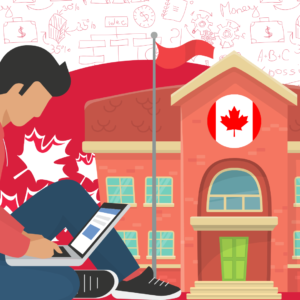COVID-19 has brought the world to its knees. Businesses have been shut, people have been locked in their homes, hospitals are flooded, schools were shut, universities were in the middle of some serious contemplation, and thousands of students who were writing their admission applications were deeply conflicted about their future.
March is the month that worries not only the admission officials but also students who have either received confirmation from their university or are almost on the verge of finally submitting the last draft of their much-revered application. For the admission officials too, it can be a particularly taxing period, especially because this is a crucial period for them to convince those admitted students to finally choose and attend their particular school. Additionally, everyone is working on more than one admissions cycle and by this time is already occupied for the next class of applicants. For most colleges and applicants, this period in itself is highly stressful with plenty of deadlines, submissions, and communication. Something as unprecedented as COVID-19 only made the situation far more difficult and chaotic in unexpected ways. Most of the experts who have observed the changing scenario because of the virus have said that the lockdown was a period where things were unfathomably changing daily, if not hourly, for most of the institutions and students (especially international students). For the universities, particularly, the decrease in international student enrollment remained a top concern.
And so, one is left wondering, how did the lockdown impact graduate applicants in this particular unforeseen period of our lives?
Many questions come to mind. Did it take away the motivation that students had towards studying in a university of their choice? Did it take away the rigour of filling an application while constantly dreaming about the country that one is going to land in? Did it put extra pressure to understand the worth of the university fees being paid? Did it bring a new shift towards how education could possibly be looked at? Did it incite fear due to the job losses that we all saw? Did it make students step back and look at the benefits of online education from the best universities around the world? Did it severely impact the mental health of applicants due to the uncertainty of what else they may have to do if it only gets worse?
The answers are not so straightforward . The major problems that applicants faced during the lockdown can be briefly summarised as follows :
- Disruption of routines and environment
- Limited access to technology and tools during the lockdown
- Severe issues emerging from isolation and restricted mobility
- Growing financial concerns, especially about meeting the university fees and funding opportunities
- A fall in the emotional and mental health
- A decrease in concentration and mind space leading to an incompetent application submission
As the pandemic triggered the anxiety of aspiring college applicants for various reasons, the international students had it even worse. They had to deal with the pressure, anxiety and confusion regarding their study visas, particularly OPT visas, as most consulates and embassies had closed down due to restrictions. Quite a few applicants were also worried about the potential hardships they would face once they graduate due to the overwhelming number of lay-offs engulfing the corporate world.
“A Bad Time to Graduate”, a report released by the Institute of Fiscal Studies (IFS), has opined that most graduates from 2020 are at risk of not finding work that suit their qualifications and that they may even choose low-income job opportunities. In fact, the job market is expected to be a lot tougher than the one we faced during the great economic slump of 2008-09. It is poised to hit the likelihood of being employed by reputed organisations and has even begun to threaten the very existence of large corporations.
Only 18% of the fresh graduates are expected to secure employment in 2021 as opposed to the more commonly seen figure of 60% over the years, according to a survey conducted by Milkround. The number of jobs available for university graduates has slumped to 61% below the pre-covid level, according to ZipRecruiter.
All roles, apart from those that belong to the development and engineering industries, have seen a reduction in the number of openings according to Clair Jenkins, a recruiter for TableCrowd talent. In fact, she noticed that most of the new recruits were recent graduates who were given comparatively lower salaries than their experienced counterparts. Moreover, the positions offered to these freshers were either short-term or part-time.
What is even more worrying is the fact that most of the jobs that are available are low-paying. Even the ones that were very well-paid before covid-19 have turned out to be low-paying opportunities. It was observed that most roles had seen a reduction of at least 10% in terms of compensation. This largescale depression of wages is expected to last until the economy is uplifted, which quite frankly may take a while. The IFS report even mentioned that most graduates will “earn less than they might have expected for a considerable period of time”.



![MBA in UK for Indian Students: Best Colleges & Universities [2024]](https://tcglobal.com/wp-content/uploads/2023/02/Cover-Image-8-300x300.png)


![MBA in UK for Indian Students: Best Colleges & Universities [2024]](https://tcglobal.com/wp-content/uploads/2023/02/Cover-Image-8-600x338.png)
